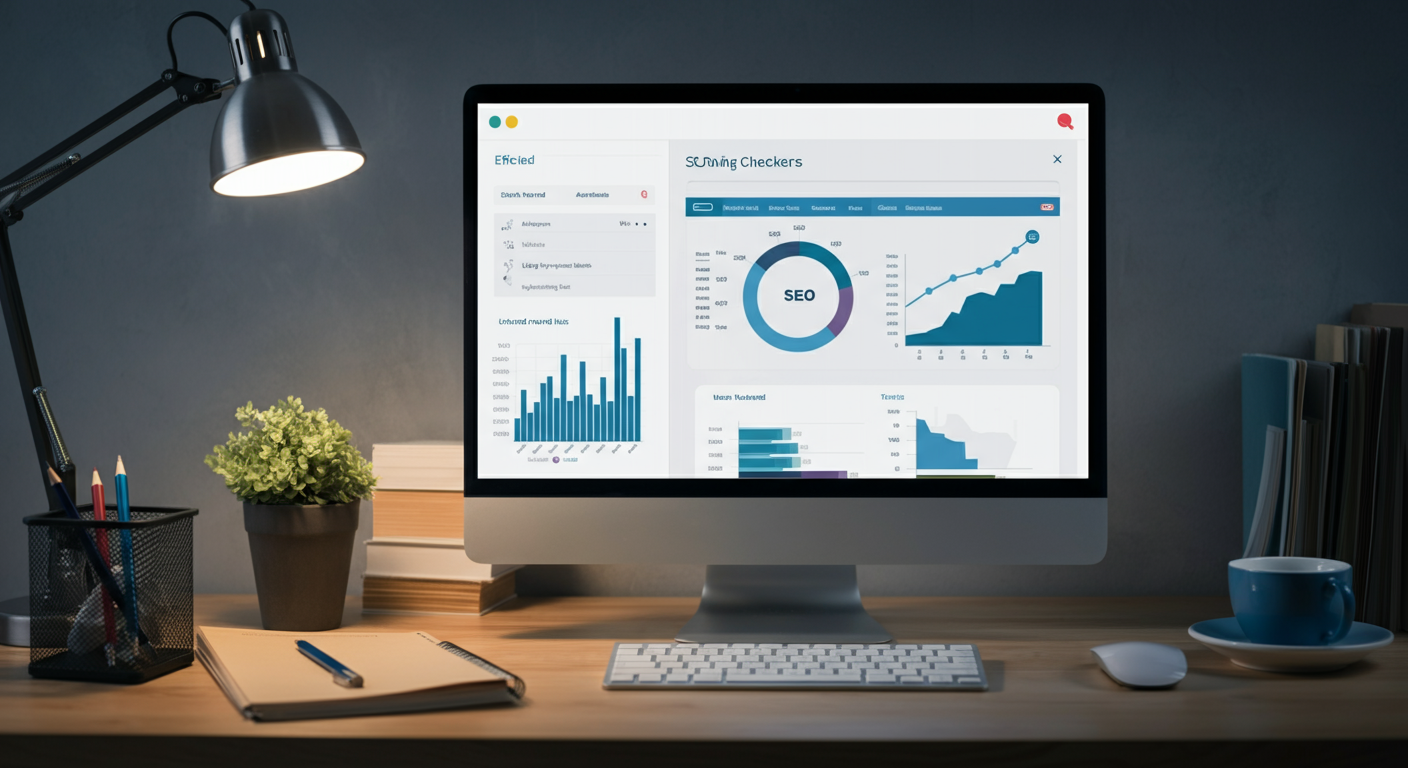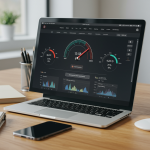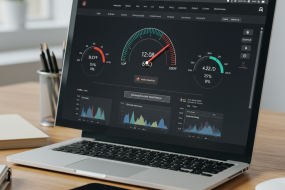
SEO ranking checkers help monitor keyword positions, analyze competitors, and measure SEO performance. They provide insights into visibility, trends, and optimization opportunities across devices and locations. When combined with analytics, ranking data supports smarter SEO decisions, improves traffic quality, and drives long-term business growth.
Search engine optimization can feel like navigating a maze blindfolded. You publish content, optimize your pages, and build backlinks, but how do you know if your efforts are paying off? The answer lies in understanding where your website ranks for the keywords that matter most to your business.
SEO ranking checkers are essential tools that reveal your website’s position in search engine results pages (SERPs). These tools help you track progress, identify opportunities, and stay ahead of competitors. This guide will walk you through everything you need to know about choosing and using the right SEO ranking checker for your needs.
What is an SEO Ranking Checker?

An SEO ranking checker is a tool that monitors your website’s position in search engine results for specific keywords. Think of it as your digital scorecard that shows how well your SEO strategy is performing.
These tools scan search engines like Google, Bing, and Yahoo to determine where your pages appear when users search for particular terms. The data they provide forms the foundation of any successful SEO strategy.
Why Ranking Position Matters
Your ranking position directly impacts your website’s visibility and traffic. Research shows that the first result on Google receives approximately 28% of all clicks, while the second position gets about 15%. By the time you reach the second page of results, click-through rates drop to less than 1%.
This dramatic difference in traffic potential makes tracking your rankings crucial for business success. Higher rankings typically translate to more visitors, leads, and revenue.
Key Features to Look for in SEO Ranking Checkers
Not all ranking checkers are created equal. The best tools offer a comprehensive suite of features that provide actionable insights beyond simple position tracking.
Accurate Position Tracking
The most fundamental feature is accurate position tracking across multiple search engines. Look for tools that provide real-time data and can track rankings in different geographical locations. This is particularly important for businesses targeting specific regions or countries.
Keyword Research Capabilities
Advanced SEO ranking checkers include keyword research features that help you discover new opportunities. These tools can suggest related keywords, show search volume data, and indicate keyword difficulty levels.
Competitor Analysis
Understanding your competitive landscape is crucial for SEO success. The best ranking checkers allow you to monitor competitor rankings, identify their top-performing keywords, and spot gaps in your own strategy.
Historical Data and Trends
Tracking ranking changes over time helps you understand the impact of your SEO efforts. Look for tools that provide historical data and trend analysis to identify patterns and measure progress.
Mobile and Desktop Tracking
With mobile searches now accounting for more than half of all queries, it’s essential to track rankings on both mobile and desktop devices. Search results can vary significantly between these platforms.
Top SEO Ranking Checker Tools
Several excellent tools dominate the SEO ranking checker market, each with unique strengths and features.
Enterprise-Level Solutions
Professional SEO platforms like SEMrush, Ahrefs, and Moz offer comprehensive ranking tracking as part of broader SEO suites. These tools provide extensive data, advanced analytics, and integration with other marketing tools.
SEMrush excels at competitor analysis and provides detailed insights into competitor strategies. Ahrefs offers one of the largest keyword databases and excellent backlink analysis. Moz provides user-friendly interfaces and reliable ranking data with strong customer support.
Budget-Friendly Options
For smaller businesses or individual users, tools like SERPWatcher, AccuRanker, and RankRanger offer focused ranking tracking at lower price points. These tools may have fewer features than enterprise solutions but still provide accurate ranking data.
Free SEO Ranking Checkers
Several free tools can help you get started with rank tracking. Google Search Console provides basic ranking data for your own website, while tools like Google’s Keyword Planner offer limited insights into search volume and competition.
However, free tools typically have significant limitations in terms of data depth, frequency of updates, and advanced features.
How to Use SEO Ranking Checkers Effectively

Simply tracking your rankings isn’t enough—you need to know how to interpret the data and take action based on your findings.
Setting Up Your Tracking
Start by identifying your most important keywords. Focus on terms that are relevant to your business and have sufficient search volume to drive meaningful traffic. Avoid the temptation to track too many keywords initially; it’s better to monitor a smaller set of high-priority terms effectively.
Configure your tracking for the right geographical locations and devices. If you serve customers in specific cities or regions, make sure your ranking checker monitors those locations specifically.
Interpreting Ranking Data
Rankings naturally fluctuate due to algorithm updates, competitor actions, and other factors. Focus on trends rather than daily changes. A drop of a few positions over a day or two usually isn’t cause for concern, but consistent declines over weeks or months require attention.
Pay attention to ranking volatility in your industry. Some sectors experience more fluctuation than others, and understanding these patterns helps you react appropriately to changes.
Taking Action Based on Results
Use ranking data to identify opportunities for improvement. If you’re ranking on the second page for important keywords, these represent your best opportunities for significant traffic gains with targeted optimization efforts.
Monitor the relationship between rankings and organic traffic. Sometimes a small improvement in rankings can lead to substantial traffic increases, while other times higher rankings may not translate to more visitors.
Common Mistakes to Avoid
Many businesses make critical errors when using SEO ranking checkers that can lead to poor decision-making and wasted resources.
Obsessing Over Daily Fluctuations
Rankings change constantly, and daily monitoring can lead to unnecessary panic or premature strategy changes. Focus on weekly or monthly trends instead of daily variations.
Ignoring Local Search Results
If you serve local customers, make sure your ranking checker tracks local search results. National rankings may not reflect how your business appears to local searchers.
Tracking Too Many Keywords
While it’s tempting to track every possible keyword, this approach can be overwhelming and expensive. Focus on keywords that directly relate to your business goals and have the potential to drive qualified traffic.
Not Considering Search Intent
Rankings alone don’t tell the whole story. A high ranking for a keyword with low commercial intent may not drive valuable traffic. Consider the searcher’s intent when selecting keywords to track.
Advanced SEO Ranking Strategies
Once you’ve mastered basic ranking tracking, you can implement more sophisticated strategies to maximize your SEO performance.
Tracking Featured Snippets
Featured snippets appear at the top of search results and can significantly increase your visibility. Many ranking checkers now track featured snippet opportunities, helping you identify content optimization opportunities.
Monitoring Voice Search Rankings
Voice search is growing rapidly, and the results often differ from traditional text searches. Some advanced tools can track how your content performs for voice queries.
Analyzing SERP Features
Modern search results include various features like local packs, knowledge panels, and image carousels. Understanding how these features affect your rankings helps you optimize for maximum visibility.
Measuring SEO Success Beyond Rankings

While rankings are important, they’re not the only metric that matters for SEO success.
Traffic and Conversion Metrics
Track how ranking improvements translate to increased organic traffic and conversions. A ranking increase that doesn’t drive more qualified visitors may not be as valuable as it appears.
Brand Visibility and Awareness
Higher rankings can increase brand awareness even when users don’t click through to your website. This indirect benefit is harder to measure but still valuable for long-term business growth.
Competitive Market Share
Monitor your share of total search visibility compared to competitors. This metric provides context for your ranking performance and helps identify market opportunities.
Making Data-Driven SEO Decisions
The ultimate goal of using SEO ranking checkers is to make better decisions about your optimization strategy.
Regular ranking analysis should inform your content creation, technical SEO improvements, and link building efforts. Use the data to identify which tactics are working and which need adjustment.
Set realistic expectations for ranking improvements. SEO is typically a long-term investment, and significant ranking gains often take months to achieve. Use your ranking data to track progress toward these longer-term goals.
Consider integrating ranking data with other marketing metrics to get a complete picture of your online performance. Rankings are just one piece of the digital marketing puzzle.
SEO ranking checkers are powerful tools that can significantly improve your search engine optimization efforts. By choosing the right tool, tracking the most relevant keywords, and interpreting the data correctly, you can make informed decisions that drive better search visibility and business results.
Remember that rankings are a means to an end, not the end goal itself. Focus on how ranking improvements contribute to your overall business objectives, and use the insights from your ranking checker to continuously refine and improve your SEO strategy.
Conclusion
SEO ranking checkers are essential for understanding search visibility and making informed optimization decisions. They help track progress, identify opportunities, and measure the impact of SEO strategies. When used correctly, ranking tools guide content improvements, technical fixes, and competitive positioning. However, rankings should always be analyzed alongside traffic, conversions, and intent. A strategic approach to rank tracking ensures sustainable growth rather than short-term gains.
Frequently Asked Questions (FAQ)
1. What is an SEO ranking checker?
An SEO ranking checker is a tool that monitors your website’s position in search engine results for specific keywords. It helps track visibility, measure SEO performance, and evaluate how effectively your optimization efforts are working over time.
2. Why is rank tracking important?
Rank tracking allows you to measure your SEO progress, identify keyword performance, and spot opportunities for improvement. Monitoring rankings helps ensure your content reaches your target audience and supports better decision-making for traffic growth and conversions.
3. How often should rankings be checked?
Rankings fluctuate daily due to algorithm changes and competitor activity. For actionable insights, it’s best to analyze trends weekly or monthly rather than obsessing over daily movements, ensuring you focus on long-term SEO performance.
4. Are free ranking checkers reliable?
Free tools, like Google Search Console, provide basic ranking data and are helpful for beginners. However, they have limitations in data depth, frequency, and competitor analysis compared to premium SEO ranking tools.
5. Can rankings vary by location?
Yes. Search results can differ significantly depending on geographic location. Local SEO ranking checkers help businesses track keywords in specific cities, regions, or neighborhoods to ensure visibility for the audience that matters most.
6. Do rankings differ on mobile and desktop?
Absolutely. Mobile and desktop results often vary due to Google’s mobile-first indexing, user experience, and page layout differences. Monitoring both ensures your website performs well across all devices.
7. What keywords should I track?
Focus on high-intent, relevant, and revenue-driving keywords. These are the terms your audience actively searches for when looking to buy products or services, ensuring ranking improvements translate to actual business results.
8. Do ranking checkers track competitors?
Yes. Many advanced SEO ranking checkers provide competitor tracking, revealing their top-performing keywords, position changes, and strategy gaps. This information helps identify opportunities to outperform rivals in search results.
9. Are rankings the only SEO metric?
No. Rankings indicate visibility but should be analyzed alongside traffic, engagement, and conversions. A high-ranking keyword that doesn’t generate traffic or leads may not be as valuable as it appears.
10. Can rank tracking improve content strategy?
Definitely. Tracking keyword rankings helps identify underperforming content, opportunities for optimization, and topics that can drive more traffic. It guides decisions for content updates, expansion, and internal linking strategies.
11. How long does ranking improvement take?
SEO is a long-term strategy. Significant ranking improvements typically take several weeks to months, depending on competition, website authority, content quality, and backlink profile. Consistency and optimization are key.
12. Are SEO ranking checkers suitable for beginners?
Yes. Many ranking tools are user-friendly, with intuitive dashboards and tutorials. Beginners can start tracking essential keywords, understand trends, and gradually explore advanced features as they become more experienced.


















No Comments